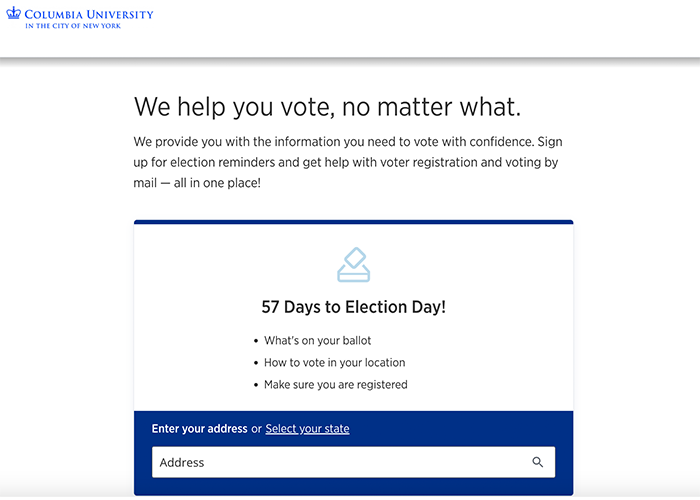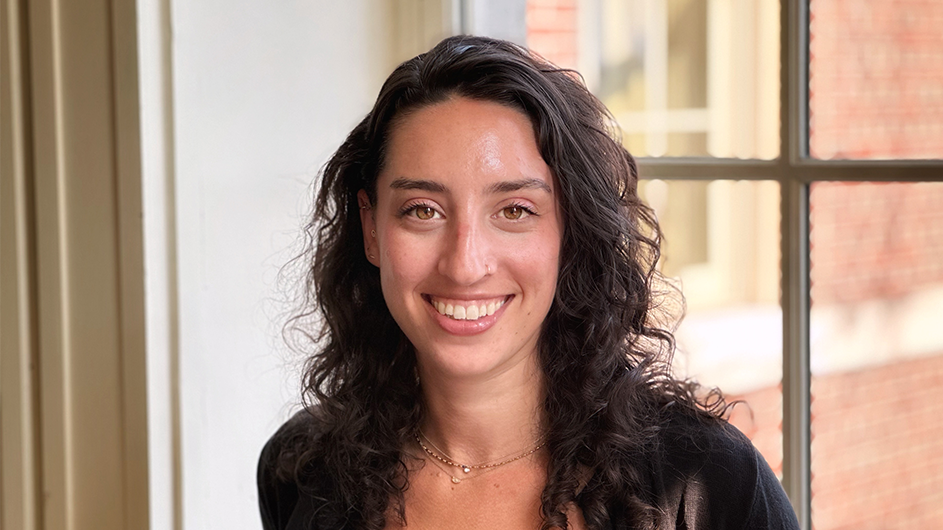Everything Columbia Students Need to Know About Registering to Vote, Absentee Ballots, and More
Audrey Litvak (SIPA'19), assistant director of government affairs at Columbia, has the answers to students' most pressing voting questions.
Audrey Litvak (SIPA'19) was just eight years old when she and her mom went to their first national convention together. Six months before she turned 18, her family helped Litvak start the process of registering to vote, all so she could cast a ballot in her first primary election in her home state of California.
As a college student, Litvak acutely remembers the questions and concerns she had about being able to vote while away at college — ultimately settling on an absentee ballot because her campus was far from home.
It's no surprise then that an early love of the electoral process translated into both a master's in urban and social policy from Columbia's School of International and Public Affairs and a ten-year career working in government and politics at the federal and local level.
Today, Litvak serves as assistant director of government affairs at Columbia, where she works as a liaison on federal, state, and local issues impacting the University. In her role, she frequently meets with Columbia students to answer questions about how to ensure their voices are heard at the polls, as well as to support voter registration efforts across campus.
We thought there could be no better person to answer some of the most frequently asked questions and concerns about student voting — which might be a little more complicated than you'd expect!
No matter what, make sure you bookmark these two resources, which can help make sure you are registered and prepared to vote in time for the General Election on Nov. 5: vote.gov and TurboVote.
What are the main options for Columbia students in terms of voting in the upcoming election?
Broadly, and it depends on your state's definition of "permanent residence," but as a Columbia student you can consider voting from your home state/permanent residence, voting absentee in your home state, or registering to vote in New York City with your campus address.
New York State allows college students to register to vote using their campus address. Students can establish residency if they have the intention to remain at their school for the time being.
Some of that depends on how students think about where their vote will matter most — you may want to register in your home state because of this, or because you know your local candidates and issues better.
How do students register to vote absentee?
This is a difficult question because the rules are different state-by-state. Some states require you to give a reason why you need absentee voting status. Some states do vote-by-mail permanently for everyone who is registered. That's the widest swath of options you might have, and there are a bunch of states that have weird idiosyncracies in the middle.
Most voter registration processes are run through your state's DMV, so I recommend students start at their home state's DMV website and there will usually be a bright, centered link about voting that gives details about your state's specific absentee voting guidelines.
Another safe tip is to Google your state alongside absentee voting, and go to the first ".gov" website outside of the paid search results.
What are the benefits and drawbacks of voting absentee?
The one thing I guide students on is that if you think you won't remember to send in an absentee ballot, you should register in New York, because you will have two weeks of early voting as well as day-of voting in a location that is convenient to where you live — you don't need to arrange travel. If you come from a state with tricky residency requirements that render you ineligible to vote absentee, then you should also register here. The most important thing is that you be able to cast your vote.
Do not take the time and money, unless you really want to, to travel at great lengths back to your home state to be able to vote in-person, day-of. Especially if that coincides with the middle of midterm exams!
My recommendation: As soon as you receive your absentee ballot in the mail, fill it out, and put it back in the mailbox, because the last thing you want to be doing on Election Day is worrying about whether your vote will make it into the local Board of Elections on time. Most states require that your absentee ballot is received by the time polls close on Election Day.
Most states don't do preliminary counting of ballots unless it is a super close election or a swing state like Michigan, Florida, Pennsylvania, Wisconsin, or North Carolina. Your vote will be counted no matter what, but it may take a while to be counted in the final vote tallies.
"My recommendation: As soon as you receive your absentee ballot in the mail, fill it out, and put it back in the mailbox, because the last thing you want to be doing on Election Day is worrying about whether your vote will make it into the local Board of Elections on time."
For Columbia students who wish to vote in New York, are they able to do so?
Yes, as a Columbia student you can register to vote in New York City with your campus address. There is no time limit you need to have resided at that address.
The limitation there is: You cannot be registered in both your home state and at your campus residence. Election law defines residence as "that place where a person maintains a fixed, permanent, and principal home into which he, she, wherever temporarily located, always intends to return."
So students who plan to return to campus after, say, a winter or summer break, qualify as living at their campus address permanently.
How does registering to vote in New York work?
You can register to vote in person at your New York DMV location, online, or by mail.
If you are trying to register to vote online, you need a New York State driver's license number. If you are submitting your registration via mail, you need to provide a driver's license number or social security number.
To mail the registration form, you can download it, print it out, put it in an envelope, and affix a stamp or you can stop by 302 Low Library and pick up a form that is already addressed and has a stamp ready for you.
For students who are registered to vote in New York, what are their options for voting?
If your permanent address is within the New York City metropolitan area (including New Jersey, Connecticut, or New York state) and you want to use your time to go travel to either your early voting polling place or day-of polling place, you can vote in person.
Apart from that, if you don't have time to travel home, you will have to vote absentee. So check out the rules regarding voting absentee in your home state of residence. The deadlines to vote absentee come up earlier than you think and are different for every state, so I would decide on this soon.
In New York, you can apply to vote absentee in-person, by mail, or online. The deadline to apply for an absentee ballot by mail or online is 10 days before Election Day (Oct. 26) or one day before Election Day at your local county Board of Elections site (Nov. 4).
At this time, there is no option to cast your ballot electronically in the United States.
Are there any special concerns for Columbia students studying abroad, with dual citizenship, or international students? Or students who have not yet turned 18?
Unique to the Columbia community is that within our international student population, there are students who hold dual citizenship, which comes with its own set of legalities and caveats.
Broadly, you can vote if you are a U.S. citizen. If you are a dual citizen and you want to vote in this election, there are two options. You can register as an "overseas voter" and your vote will not go to the general electoral college vote, but it will be counted in the popular vote. Or, you could alternately register to vote in New York so long as you meet residency requirements.
This is different than voting absentee because you are studying or living abroad for a short time. It sometimes applies to military families.
Because Columbia has a lot of international students, sometimes I get questions about if international students can register to vote in U.S. elections based on campus residency. Unfortunately, no, you cannot register to vote in a U.S. election as an international student without U.S. citizenship.
One other note is that if you are turning 18 before the Nov. 5 election, many states allow you to pre-register to vote up to six months in advance of your 18th birthday. You can find more information here.
How can students ensure their vote is heard in the Nov. 5 General Election?
One thing I recommend to students is to carefully look into the down-ballot races that you care about where you want to register to vote, like Congress or Senate seats, or state Congress or Senate, or even municipal elections. You probably know more about local elected officials and the issues that impact residents back home than you do in New York at this point.
If a student is trying to decide how to make their vote heard the most, I would encourage people to look down-ballot, not just the big-ticket races. Think about where your vote will have the most impact given current polling. Will your vote make more of a difference in a predominantly Republican or Democrat state? Is your state a swing state? These are all things to consider.

How does Columbia partner with TurboVote to help students register and get reminders about voting?
TurboVote is a resource that Columbia University has a partnership with, along with many other universities, to provide resources and information around elections for students. On TurboVote, you can enter the address where you will be voting and be directed to registration information as well as sign up for email or text reminders about voting deadlines, whether to apply, vote absentee, or submit your ballot for this or any future election.
While this presidential election is very, very important, there are elections federally every two years and locally sometimes multiple times every year.
If you want to continue to be civically engaged after the election in November, TurboVote will help remind you of those dates and deadlines too.
